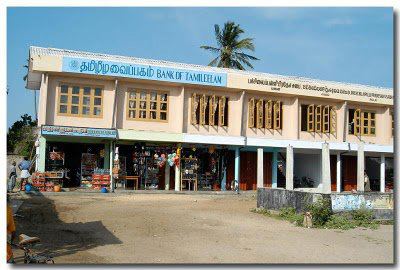
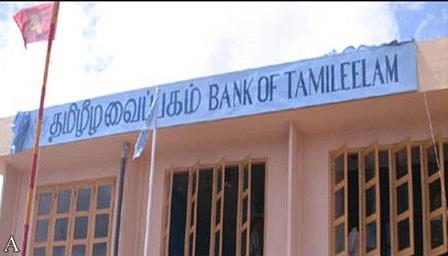
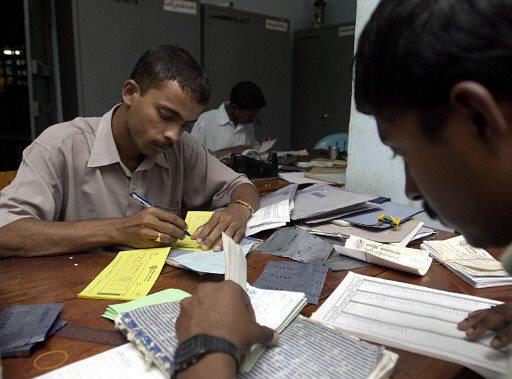
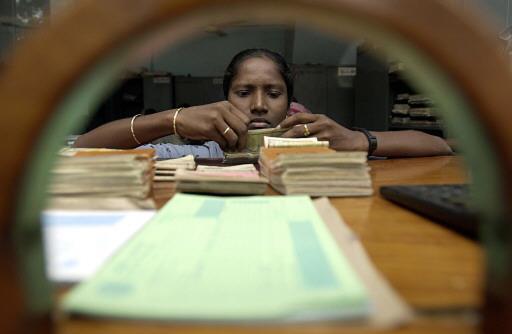
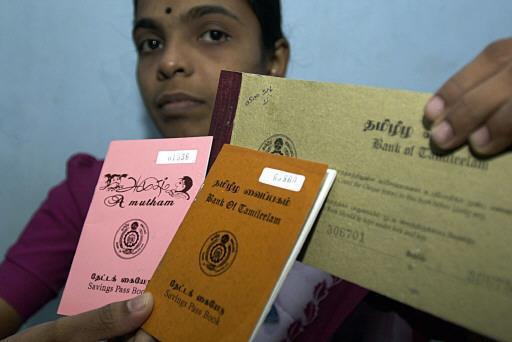
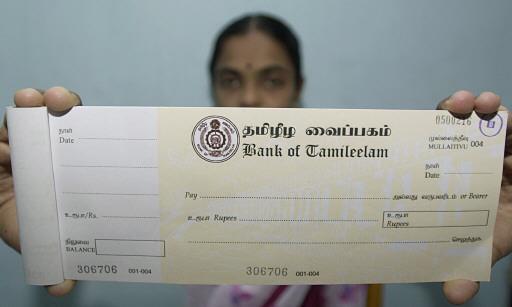
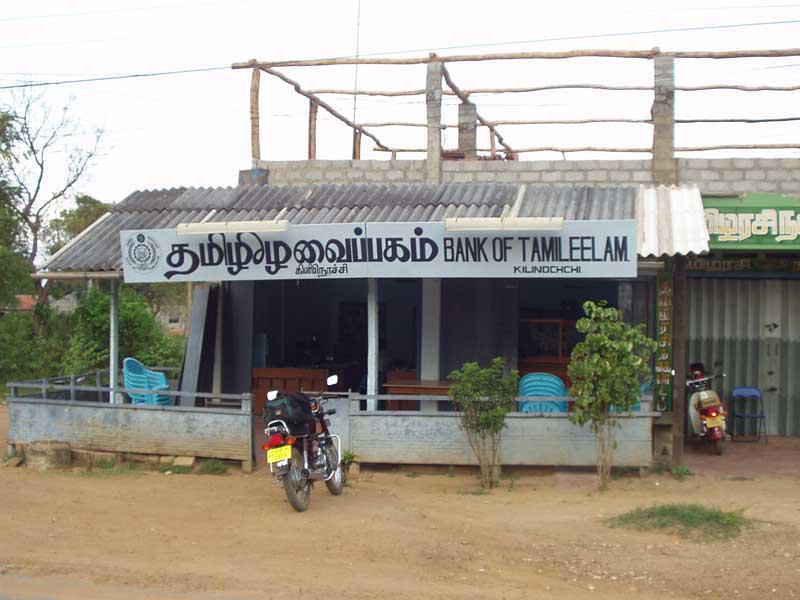
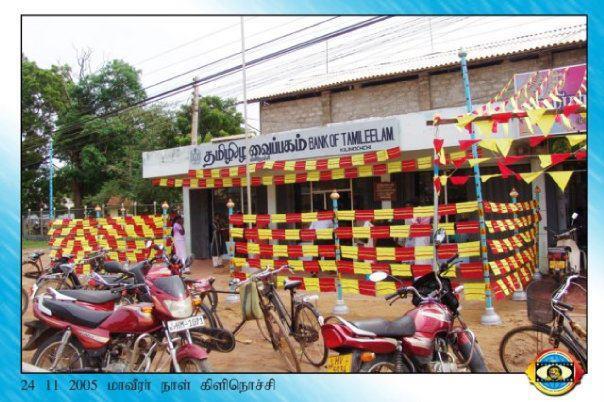
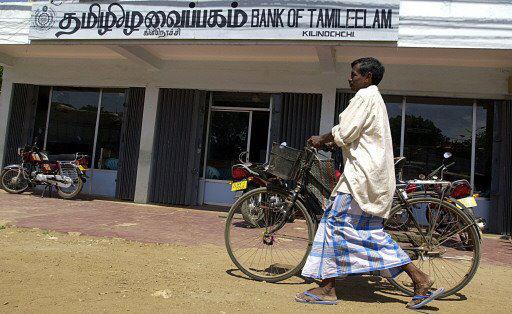
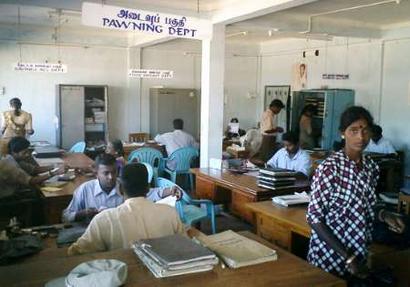
REUTERS-FEATURE
Reuters, 2004 March 10, 20:31 ET
By Geert De Clercq
KILINOCHCHI, Sri Lanka, March 11 (Reuters) - There's no marble in the lobby, no computer on the counter and no air-conditioning for the customers. The risk of robbery is also very small.
Welcome to the Bank of Tamileelam, the world's only rebel-held bank, and a symbol of autonomy for the Liberation Tigers of Tamil Eelam (LTTE), who run a semi-independent state in the north and east of Sri Lanka.
"Our bank was set up so that money deposited by Tamil people will be reinvested in the north and east," Amalan Rasanayagam, chief loan officer at the Kilinochchi branch, told Reuters. He added that funds gathered by Sri Lankan banks in the north and east are never used for development in these areas. Analysts say the bank's meaning goes well beyond investment. For most of the past two decades, the LTTE has had de facto control of much of Sri Lanka's northern and eastern provinces and their "capital" Kilinochchi is one huge exercise in normality. Stretched along the infamous A9 "Highway of Death", Kilinochchi sports its own schools, hospitals, court house, police force, tax authorities and the Bank of Tamileelam, the financial centre of the rebel administration. "All these institutions have been set up as a parallel administration, a parallel regional regime," Jayadeva Uyangoda, head of the department of political science at Colombo University, told Reuters.
In February 2002, the LTTE signed a ceasefire with the Sri Lankan government that has solidified its grip on its territory. In December 2002, the LTTE dropped its old demand for a separate state and now argues for internal self-determination within a federal Sri Lanka. An approaching April 2 general election will be fought over how to follow up the ceasefire with a political deal to end two decades of war in which 64,000 people have died.
The LTTE has not waited for peace to show it can run a state and Kilinochchi, a dusty town of 65,000, makes that point. But in case one forgets that the LTTE is still at war with the Sri Lankan government and that the United States has designated it a "terrorist organisation", guns are never far away in rebel town. Across from the Tamileelam Bank one scorching afternoon, a rebel-operated bus stopped at a rebel-run restaurant, which brought out ice cream for a group of female LTTE cadres, with trademark black belts around their slender waists, too-large machine guns dangling from their shoulders.
The LTTE is known as one of the world's most ruthless and efficient rebel groups, which could explain the low security at the Tamileelam Bank, where a guard helps stamp savings books. Other than that, the rebel bank is surprisingly normal. It was founded in Jaffna in 1994, but after the Sri Lankan army retook the peninsula at the northern tip of the island in 1995, the bank moved to Kilinochchi.
The bank does not release data on its total assets, profitability or ownership, but its rates are no secret. Depositors get 7.5 percent on three-month savings accounts, going up to 10.5 percent for 24-month deposits, in line with most Sri Lankan banks. But borrowers pay 15 to 17 percent on loans for motorcycles, tractors and trailers, well above the rate of about 10 percent that competing banks typically charge. Local banks declined to comment on their dealings with Tamileelam bank.
The bank is not regulated by the central bank, but it does have relationships with the offices of some Sri Lankan banks that operate in rebel territory. It also uses the Sri Lanka rupee, as the rebels have not gone so far as to issue their own currency. Rasanayagam said the bank was not directly owned by the LTTE. "The LTTE controls the Eelam Bank like the Sri Lanka central bank controls other banks," he said. The issue of control is a sore point for the authorities. "There is no such bank registered or recognised by the central bank. Legally, it is not possible to operate a bank in Sri Lanka without a license from the central bank," deputy central bank governor P.M. Nagahawatte told Reuters.
During two visits to the bank's main branch in Kilinochchi, the Tamileelam bank office looked a lot busier than the offices of two nearby state-owned banks. But some analysts in Colombo say the Tamileelam bank's success is partly based on fear, as people in rebel areas might be nervous about being seen entering a Sri Lankan bank.
A.K. Selvavinayagam is general manager of Vanniyam Vannibam, one of the LTTE's many companies. It employs 225 people and runs a guesthouse, a transport system and a crushed metal firm. He and other customers told Reuters they have accounts at the Tamileelam bank and the local offices of Sri Lankan banks in Kilinochchi and that Tamileelam cheques are cleared by some Sri Lankan banks and vice versa.
With the Tamileelam Bank he has 8,000 rupees ($80) in a savings account, recorded in a pass-book, and he has also taken a 39,000 rupee ($390) loan to buy a five-bulb solar power system. Selvavinayagam earns 8,500 rupees ($85) per month, plus free meals, a good salary for that part of the country. Since a few months ago, eight percent of his salary, plus another 12 percent from his employer, is paid into the Employee Trust Fund, another LTTE-run institution.

| 
| 
|

| 
| 
|

| 
| 
|
Copyright 2004, Reuters News Service
See also CDN 2006-06-19